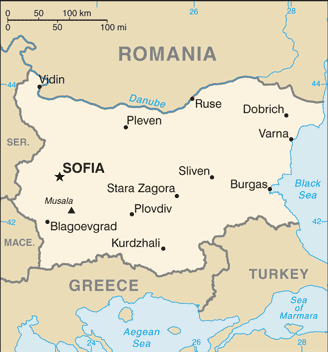Discovering Bulgaria, A Journey Through Its Diverse Landscapes
Bulgaria, located in Southeastern Europe, is a country full of rich history, vibrant culture and stunning landscapes. From majestic mountains to idyllic beaches and charming cities, Bulgaria offers a wealth of attractions for travelers. In this article, we'll take a virtual tour of Bulgaria on a map, exploring its diverse regions and highlighting the unique features that make it such a captivating destination.
Sofia - the cultural heart:
Our journey begins in the capital city of Sofia, located at the foot of Vitosha Mountain. Sofia is a mix of ancient history and modernity, where visitors can see Roman ruins, Ottoman mosques, and grand Soviet-era architecture. The city is home to many museums, art galleries and theatres, offering a vibrant cultural scene. Don't miss visiting the iconic Alexander Nevsky Cathedral and strolling through the beautiful Borisova Gradina Park.
Rila Parvat - Nature's Glory: Bulgaria map
Continuing south from Sofia, we reach the Rila Mountains, a paradise for nature lovers. Here, the Rila National Park attracts with its breathtaking alpine landscapes, crystal-clear lakes and dense forests. The crown jewel of the region is the Rila Monastery, a UNESCO World Heritage Site and a spiritual center for Orthodox Christians. Hiking enthusiasts can tackle the challenging route up Mount Musala, the highest peak in the Balkans, and be rewarded with panoramic views.
Plovdiv - Ancient Treasures: Bulgaria map
Continuing east, we reach Plovdiv, one of the oldest cities in Europe. Plovdiv boasts a remarkable mix of Roman, Byzantine and Ottoman influences, which is reflected in its well-preserved old town. Explore the charming streets lined with colorful houses, visit the ancient Roman theater and admire the intricate architecture of the Ethnographic Museum. Plovdiv is also known for its vibrant arts scene and hosts the prestigious Plovdiv International Fair.
Black Sea Coast - Sun, Sea and History:
Moving northeast, we encounter Bulgaria's stunning Black Sea coast. This stretch of coastline is famous for its picturesque beaches, vibrant resorts and charming coastal towns. Sunny Beach, a popular tourist destination, offers a vibrant nightlife, while Nessebar, a UNESCO World Heritage Site, enchants visitors with its ancient ruins and medieval churches. For a quieter experience, explore the quiet coastal town of Sozopol or relax on the pristine beaches of the Bulgarian Riviera.
Rhodope Mountains - Mysterious Beauty:
As we move south, the majestic Rhodope Mountains captivate with their mystical allure. Known for its folklore and legends, the region is home to charming villages, lush forests and rugged peaks. Explore the unique rock formations of Amazing Bridges, visit the ancient Thracian sanctuary of Perperikon, and immerse yourself in the local Rhodopean culture. The Rhodope Mountains offer opportunities for hiking, horse riding and experiencing traditional Bulgarian hospitality.
Bulgaria, with its diverse landscapes and rich heritage, is a hidden gem waiting to be discovered. From the vibrant city life of Sofia to the tranquil beaches of the Black Sea Coast and the breathtaking mountains in between, Bulgaria offers something for every traveller. Whether you're interested in history, nature or cultural experiences, this Balkan nation promises a trip to remember. So pack your bags and embark on an adventure across the captivating map of Bulgaria to make lasting memories in this enchanting country.
Here are some interesting facts about Bulgaria:
- Location and borders: Bulgaria is located in Southeastern Europe, bordered by Romania to the north, Serbia and North Macedonia to the west, Greece and Turkey to the south, and the Black Sea to the east.
- History: Bulgaria has a rich history since ancient times. It was founded in 681 AD and is one of the oldest countries in Europe. Throughout its history, Bulgaria has been influenced by various empires, including the Byzantine Empire and the Ottoman Empire.
- Language: The official language of Bulgaria is Bulgarian, which is a South Slavic language. It uses the Cyrillic alphabet, which was developed during the 9th century in the First Bulgarian Empire.
- Religion: Most Bulgarians belong to the Eastern Orthodox branch of Christianity. The Bulgarian Orthodox Church is an integral part of the country's cultural and religious identity.
- Rose Valley: Bulgaria is famous for the production of roses and rose oil. The Rose Valley, located in central Bulgaria, is one of the largest producers of rose oil in the world. The annual Rose Festival in Kazanlak celebrates this tradition.
- UNESCO World Heritage Sites: Bulgaria is home to nine UNESCO World Heritage Sites. These include the ancient Thracian mausoleum of Kazanlak, the Rila Monastery, the Boyana Church in Sofia, and the early medieval rock-cut Madara Rider.
- Mountains and Nature: Bulgaria is known for its diverse landscapes, including the Balkan Mountains, the Rhodope Mountains, the Rila Mountains, and the Pirin Mountains. Mount Musala in the Rila Mountains is the highest peak in Bulgaria and the entire Balkan Peninsula.
- Traditional Cuisine: Bulgarian cuisine includes a variety of dishes influenced by its history and neighboring countries. Popular dishes include banitsa (pastry filled with cheese or spinach), kabache (grilled minced meat), shopska salad (a fresh vegetable salad with cheese), and tarator (cold cucumber soup).
- Yogurt: Bulgarian yogurt is famous all over the world for its unique taste and health benefits. It is made from Lactobacillus bulgaricus, a bacteria strain discovered by Bulgarian scientist Dr. Stamen Grigorov.
- Folklore and Traditions: Bulgaria has a rich folklore tradition including traditional music, dance and colorful costumes. Held in different regions of the country, the Kukeri festival involves men wearing elaborate masks and costumes to perform rituals to scare away evil spirits.

Comments
Post a Comment